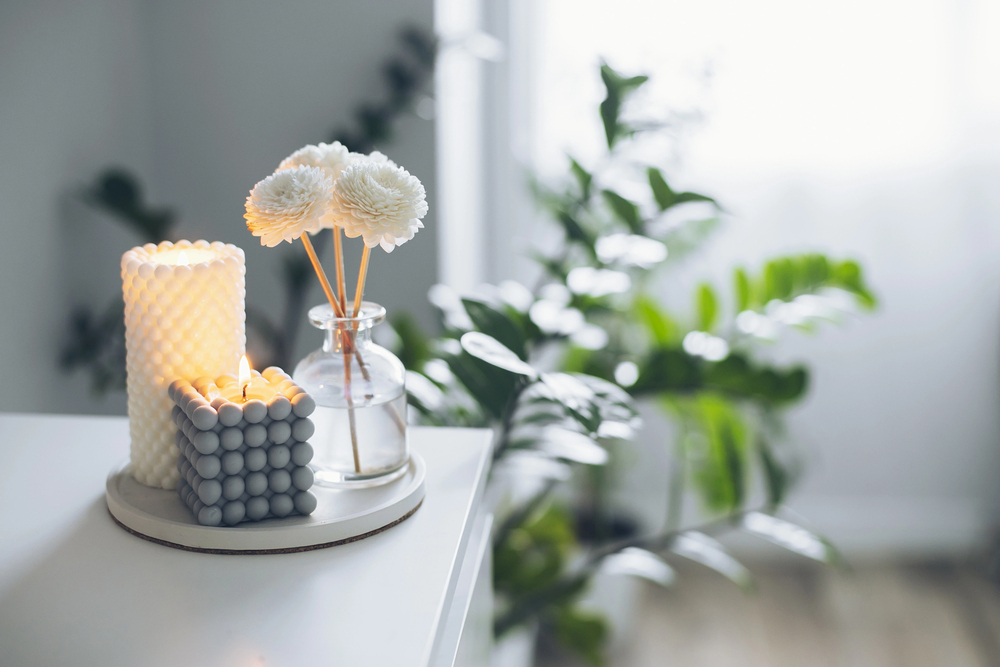The right scent can completely change how a room feels. It can make a house smell welcoming after a long day, give a burst of energy on a slow morning, or help you wind down in the evening.
But there’s more to home fragrance than just picking something that smells nice. If you share your space with children, pets, or guests, it’s worth thinking about what’s actually in those products and how they affect the air you breathe.
When you find that balance, fragrance becomes a quiet background note that adds warmth without ever feeling overpowering.
Choose Safer Fragrance Sources from the Start
The first step is being picky about what comes into your home. Most store-bought candles are made with paraffin wax and synthetic scents, which can release particles and chemicals into the air once they’re lit.
That doesn’t mean you have to ditch candles altogether. Just look for cleaner options like soy or beeswax with cotton or wooden wicks. These burn more evenly and produce less soot, so the scent you notice is the one you chose, not something from added dyes or fillers.
If you love wax melts or oils, read the labels carefully. Oils should be high-quality and properly diluted, and melts should list exactly what they contain.
Even the nicest-looking product can have hidden ingredients you wouldn’t want in your lungs. Taking a moment to find out if wax melts are toxic can save you from bringing something into your home that might cause irritation or allergies over time.

Use home Fragrance Strategically, Not Excessively
It’s tempting to put a scented product in every room, but filling the house with competing aromas can make them harder to enjoy. Instead, think about where a scent will have the most impact, maybe the living room where guests spend time, or your bedroom for a calming end to the day.
By keeping it focused, you create pockets of fragrance that feel intentional and noticeable.
You don’t have to stick with the same scent all year. Swap things around with the seasons. Do something light and citrusy when the days are warm, then move to cosy, spiced notes when the weather turns colder.
Changing it up keeps the scent fresh to your nose, so you keep noticing it and enjoying it, instead of letting it fade into the background.
Pair Fragrance with Clean Air Habits
The best-smelling homes have one thing in common: the air is fresh before any home fragrance is added.
Opening windows for just a few minutes a day, even in colder months, can refresh a room far more than you might expect. Air-purifying plants like spider plants or peace lilies quietly work in the background to reduce pollutants while adding life to your décor.
When you combine these habits with your favourite scents, the results are better for both your health and your senses.
If you also take small steps to improve indoor air quality, like using a HEPA filter or keeping vents dust-free, you won’t feel the need to rely on heavy home fragrances to mask unwanted odours. Instead, scent becomes a gentle finishing touch to an already clean space.

Match Scent to Style and Function
Fragrance works best when it fits the mood and purpose of a space. A soft lavender or chamomile blend can make a bedroom feel more restful, while a crisp linen scent in the kitchen suggests freshness and order.
Pairing scent with design is a simple but effective way to elevate your living space. People might not realise why the room feels so inviting, but the mix of fragrance and thoughtful details sticks with them long after they leave.
Make Safety a Daily Habit
Even the most natural products can cause problems if they’re not used carefully. Keep candles on a steady, heatproof surface and well away from curtains or stacks of paper. Place diffusers and wax warmers somewhere curious pets or small hands can’t reach.
If you use oils, tuck the bottles out of sight and tighten the lids so they can’t spill. It’s also worth knowing which scents aren’t pet- or child-friendly. Tea tree, eucalyptus, and some citrus oils can cause problems for animals even in tiny doses.
Taking a minute to check before bringing a new scent into the house can spare you an emergency vet visit, making home fragrance feel like a safe treat instead of an unintentional risk.

Choose Fragrance to Complement Freshness, Not Cover Problems
A candle might hide yesterday’s cooking smell, but that doesn’t solve the issue. Addressing the cause of an odour first, whether it’s damp laundry, a forgotten bin, or poor ventilation, makes any added scent work better.
Simple routines like airing out rooms after cooking, vacuuming regularly, and keeping moisture-prone areas dry go a long way toward preventing odours in the first place.
Once the space feels clean and fresh, a light fragrance can become the final layer that makes the whole room feel complete. The result is a home that not only smells good but truly is healthier and more inviting, something both you and your guests will appreciate.
Image Credit: depositphotos.com






























